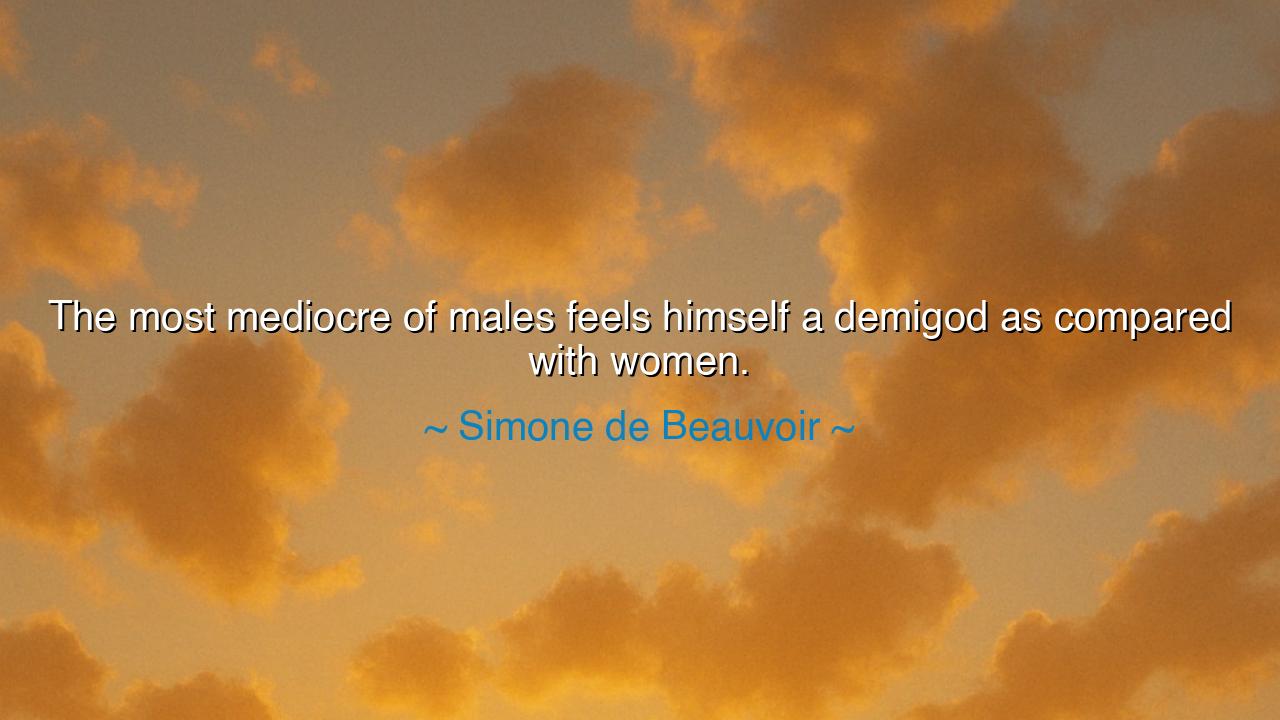
The most mediocre of males feels himself a demigod as compared






The words of Simone de Beauvoir — “The most mediocre of males feels himself a demigod as compared with women.” — strike with the force of revelation. They unveil the arrogance of a world built on false hierarchies, where even the weakest of men could claim superiority over the strongest of women. In this, de Beauvoir exposes the illusion of power: that it is often granted not by merit, but by custom, prejudice, and inherited dominion.
To call a man mediocre is to remind us that greatness was never his by nature, but bestowed upon him by a society that exalted his sex. And yet, in such a world, even the lowest male might strut as though crowned with divine favor, imagining himself a demigod over women who often surpassed him in intellect, endurance, and spirit. The tragedy lies not only in the arrogance of men, but in the silencing of women’s true worth, buried beneath centuries of disdain.
History gives many examples. Recall Hypatia of Alexandria, a philosopher and mathematician of dazzling brilliance. Surrounded by men of lesser mind, she yet suffered persecution and death, not because of mediocrity on her part, but because of fear and resentment from those who thought themselves her superiors. Or consider the countless women whose works were hidden, published under male names, or dismissed entirely, while ordinary men strutted forward with honors they scarcely earned.
De Beauvoir’s words are also a challenge to women themselves: to recognize that the veil of inferiority placed upon them is an illusion, and that no man’s mediocrity grants him true divinity. She calls her readers to awaken, to cast off the chains of comparison, and to see that greatness is not the inheritance of gender, but of courage, wisdom, and will.
Let the generations remember: arrogance without merit is the surest mark of weakness, and societies that exalt mediocrity over true brilliance sow their own ruin. The false demigods of history are forgotten, while the silenced voices of women rise again with the passage of time. Simone de Beauvoir’s words are thus both lament and prophecy: that the illusion of male superiority will crumble, and that when women stand revealed in their full power, the world will be remade in truth and justice.






VTNguyen Van Tien
I find this quote so striking because it reveals a painful truth: that societal norms often give men, regardless of their abilities, a sense of inherent superiority. How do we challenge these norms, and how do we shift the narrative from one of dominance to one of equality and respect between men and women?
HNNguyen hoang nam
This quote from de Beauvoir makes me question how deeply these unequal dynamics affect the way men and women view themselves and each other. What can be done to change the power dynamics at such a fundamental level? How can we create a society where merit and equality replace these outdated and unjust feelings of superiority?
NVNguyen Vu
It’s painful but true that this quote highlights how even average men can often feel entitled to power over women. I wonder—how much of this is due to historical systems of patriarchal control, and how much is embedded in everyday interactions and language that we don’t even notice?
CM12A12-17- MAI THANH CHI MAI
This quote is both a stark critique of gender inequality and a reflection of how ingrained these disparities are in our social consciousness. Why do you think that even men who may not be exceptional often feel a sense of superiority over women? What role does culture play in reinforcing this sense of entitlement?
MAHoang Minh Anh
Simone de Beauvoir’s quote speaks to the deep-seated inequalities that have existed between men and women for centuries. It highlights how societal structures often elevate even the most mediocre men above women, regardless of their actual merits. How do we dismantle these perceptions in a society where men are often unconsciously given more authority and respect than women, even without merit?